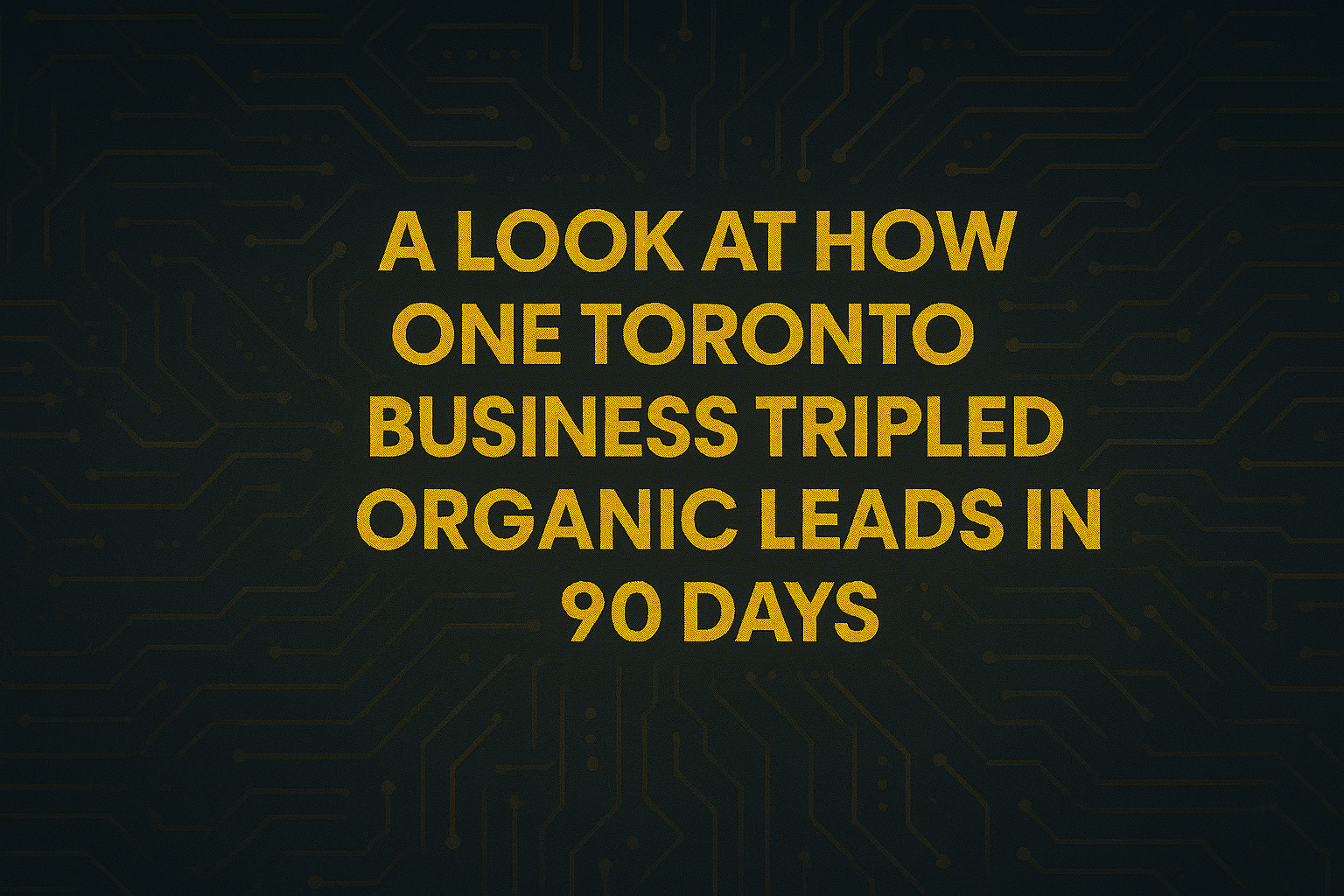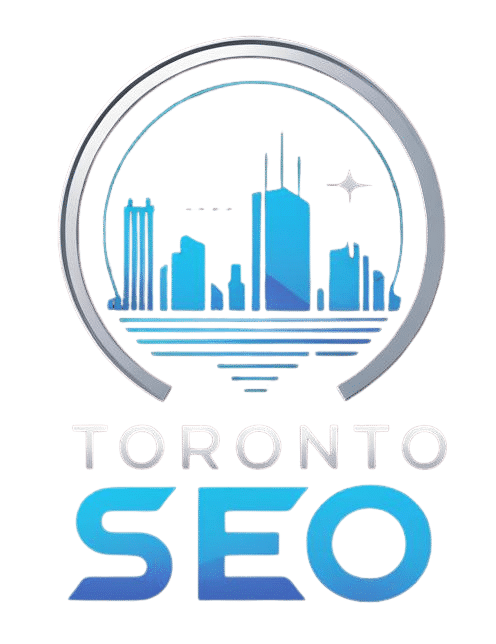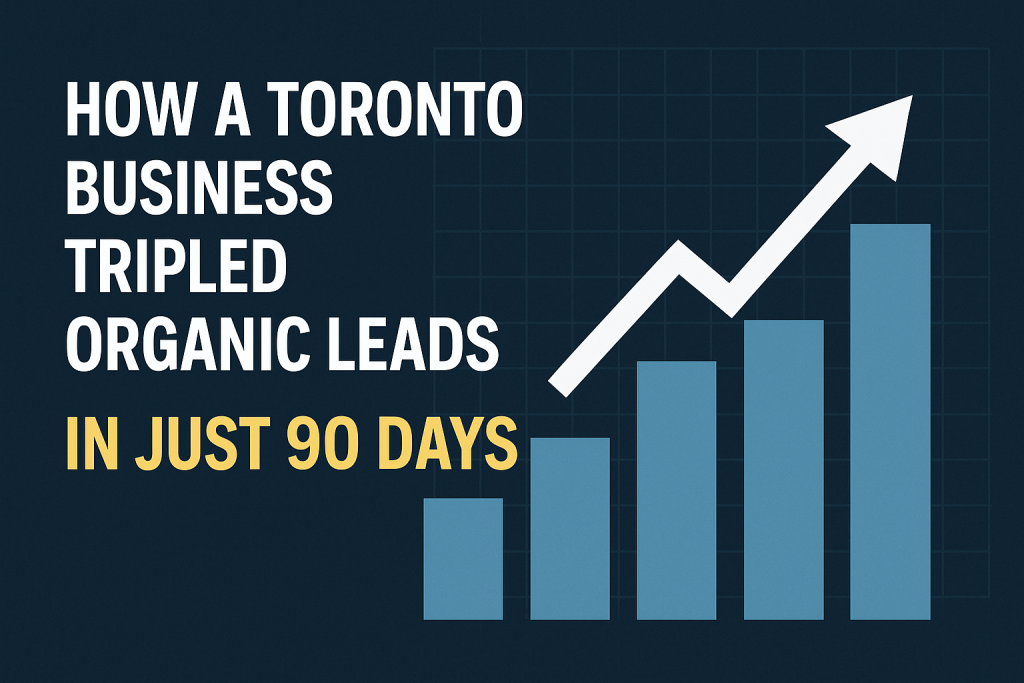
Understanding the Challenge: A Saturated SEO Landscape in Toronto
Toronto is one of the most competitive SEO markets in North America. Between countless agencies, service providers, and local businesses investing heavily in digital strategies, standing out is no small feat. One local business faced this reality head-on and turned the tide, achieving a 300% increase in organic leads in just three months.
Their journey involved strategic content optimization, AI-powered keyword clustering, and a focus on user-intent-driven SEO—elements now crucial in the post-2025 search engine environment.
Step 1: Conducting a Deep SEO Audit and Competitor Gap Analysis
Before anything else, the company launched with a comprehensive site audit, identifying:
Technical issues (slow load speed, crawl errors)
Thin or outdated content
Keyword cannibalization
Weak backlink profile
Using tools like Google Search Console and Screaming Frog, they benchmarked against top Toronto SEO companies and discovered missing content opportunities their competitors were leveraging—especially AI content clusters.
This step set the foundation. A similar approach has been covered in this guide about SEO vs. Google Ads in Toronto, highlighting why SEO often yields higher ROI in the long run.
Step 2: Leveraging AI Keyword Clustering to Target Search Intent
Instead of randomly targeting high-volume keywords, the team implemented AI-driven keyword clustering. This approach grouped long-tail, intent-based keywords around themes like:
“Affordable [service] in Toronto”
“Top-rated [industry] professionals near me”
“How to choose the right [service] provider”
These clusters were mapped into content silos, interlinked to boost topical authority and improve Google’s semantic understanding of their site.
Their strategy mirrors what’s explained in Toronto marketing agencies using AI-driven keyword clustering in 2025, showcasing how AI can cut research time and improve CTRs.
Step 3: Rewriting and Optimizing High-Value Pages for UX and SEO
Rather than creating dozens of low-quality posts, the business updated 15 cornerstone pages, focusing on:
Improved headers using natural keyword placement
Internal linking to relevant service and blog pages
Engaging above-the-fold content
Visual elements like infographics and FAQs
They also employed data from Google’s Latest Algorithm Update to ensure content followed E-E-A-T (Experience, Expertise, Authoritativeness, Trustworthiness) guidelines. This strategy aligns with the insights in Understanding Google’s Latest Algorithm Update.
Step 4: Amplifying Authority with Local SEO and Citation Building
To dominate local search, they focused on:
NAP consistency across 100+ directories
Building niche citations on Toronto-focused platforms
Getting featured in local publications and forums
They also optimized their Google Business Profile, uploading weekly posts and requesting keyword-rich reviews from customers. The role of citations in 2025 local SEO dominance is detailed in Why Citation Building Still Matters for Toronto Rankings.
Step 5: Increasing Dwell Time with Value-Packed Content and UX
Content without engagement fails. To keep users longer on the site and reduce bounce rates, they:
Added embedded videos on key pages
Introduced interactive tools (e.g., service cost estimators)
Crafted in-depth blog content (1,500+ words per post)
Used breadcrumbs and clear calls-to-action
This aligns with what leading SEO companies are doing today. Read about what makes a great Toronto SEO company and how UX-first strategies are central to client success.
Step 6: Building Topical Authority with Strategic Blogging
They published weekly long-form articles addressing specific pain points and search queries of their target audience. Examples included:
“What to Look for in a Trusted [Service] Provider in Toronto”
“Why You’re Not Ranking: Top SEO Mistakes in 2025”
“DIY vs Hiring an SEO Expert: What Toronto Businesses Must Know”
Strategic use of internal linking helped users and search engines navigate easily. For example, one article linked to Hiring a Toronto SEO Expert vs Doing It In-House to help business owners make more informed decisions.
Step 7: AI + Prompt Engineering for Scalable SEO Execution
What accelerated their campaign the most was prompt engineering with generative AI tools. They used tools like ChatGPT and Jasper to generate:
SEO-optimized metadata
FAQ schema content
Long-tail keyword blog outlines
This process saved time and enhanced scalability. It reflects the ongoing trend covered in Why Prompt Engineering Is the Secret Weapon for SEO Firms in Toronto, where Toronto firms are using AI to produce better SEO outputs faster.
Step 8: Performance Monitoring and Iteration with Analytics
They monitored performance weekly using:
Google Analytics 4
Heatmaps (Hotjar)
Ahrefs for backlink tracking
Pages that performed below average were revised with A/B tests and user behavior insights. The business aligned its efforts with insights from How to Track SEO Performance with Analytics, ensuring continuous growth.
Final Results: 3X Organic Leads in 90 Days
After just three months:
Leads grew from 90/month to 280+/month
Organic traffic increased by 230%
Ranking keywords on Page 1 rose by 178%
Average time-on-site increased by 1.6x
These numbers weren’t magic—they were the result of precise technical SEO, content excellence, and local dominance strategies. The business now ranks among Toronto’s top competitors in their niche and continues to scale.
Lessons Toronto Businesses Can Apply Today
Use AI keyword clustering to build content silos
Focus on high-value pages over mass content production
Embrace prompt engineering to reduce production time
Double down on local citations for map pack visibility
Build topic authority with long-form blog content
If you’re a small business in Toronto and unsure how to start, begin by reading this essential guide: Navigating the Digital Landscape – Tips for Small Businesses
Need Help Implementing This for Your Business?
If you want to replicate this 90-day SEO growth strategy for your Toronto-based company, reach out through our Contact Page and let us walk you through the step-by-step process.


